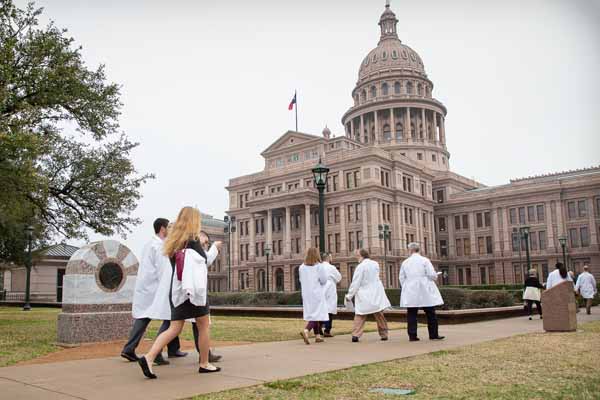
Quickly following a series of legislative hearings to address the Uvalde shooting, Texas leaders have announced the transfer of more than $105.5 million within the state budget to fund a series of school safety and mental health programs through August 2023.
The move heeds several recommendations from the Texas Medical Association and several state specialty societies. In a statement from the governor’s office quoting several state leaders, Speaker Dade Phelan (R-Beaumont) said lawmakers will consider these recommendations and other outstanding proposals during the interim period and throughout the upcoming legislative session, which begins in January.
House Appropriations Chair Rep. Greg Bonnen, MD (R-Friendswood) commended the funding push, which stems from the school shooting at Robb Elementary School in Uvalde on May 24.
“[T]his commitment will ensure additional telehealth services are quickly available to more school-aged children both within the Uvalde community and across the state,” he said in the governor’s statement.
Drawing mostly on surplus funds in the Texas Education Agency budget, state leaders allocated:
- $50 million for bulletproof shields for local law enforcement;
- $17.1 million for school districts to purchase silent panic alert technology;
- $10 million for rapid response training and associated travel costs for local law enforcement, including school resource officers;
- $7 million for the Texas School Safety Center to provide training, assessments, and support to school districts as they review their emergency operations plans and address campus security needs;
- $5.8 million to expand the Texas Child Health Access Through Telemedicine (TCHATT) program, which provides telemedicine services to schools to identify, assess, and treat students with behavioral and mental health needs;
- $5 million to expand fusion centers, which could help facilitate data-sharing among local, state, and federal law enforcement agencies to identify threats to school districts;
- $5 million to evaluate mental health services in Uvalde and prepare a needs assessment for the legislature;
- $4.7 million to increase the number of Multisystemic Therapy teams, which have been proven to reduce the risk of violence; and
- $950,000 to expand Coordinated Specialty Care Teams, which treat youth experiencing their first episode of psychosis.
TMA and seven state specialty societies called for a multipronged approach to strengthen the state’s health and social services, including the statewide expansion of TCHATT, in written testimony submitted to the Senate’s Special Committee to Protect All Texans on June 22.
TMA welcomes the investment in TCHATT. Meanwhile, state leaders continue to evaluate a series of other proposals by TMA and the other organizations, including to:
- Establish Medicaid and Children’s Health Insurance Program payment for physicians and health care providers who screen patients for adverse childhood experiences (ACEs);
- Set a Medicaid policy framework to better integrate clinical and community services designed to address nonmedical drivers of health;
- Expand crisis intervention and trauma-informed training among health professionals, school and community leaders, and families;
- Increase outpatient and inpatient mental health hospital capacity for children and adolescents; and
- Widen Texas’ statewide Safe Gun Storage Campaign.
“We know as physicians that positive experiences in childhood – specifically safe, secure, nurturing relationships with trusted adults, such as teachers, extended family members, parents, [and] counselors – we actually know that those types of relationships can negate the toxic effect of ACEs. And that’s a powerful thing,” Lubbock pediatrician Celeste Caballero, MD, testified on behalf of TMA and the other organizations during the special committee hearings.
Emma Freer
Associate Editor
(512) 370-1383